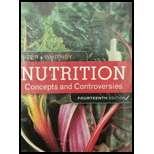
Bundle: Nutrition: Concepts and Controversies, Loose-leaf Version, 14th + LMS Integrated for MindTap Nutrition, 1 term (6 months) Printed Access Card
14th Edition
ISBN: 9781337127547
Author: Frances Sizer, Ellie Whitney
Publisher: Cengage Learning
expand_more
expand_more
format_list_bulleted
Concept explainers
Question
Chapter 6, Problem 11SC
Summary Introduction
Interpretation:
Of whether the statement ‘partially completed proteins are not held for the completion at a later time when the diet may improve, is true or false.
Concept Introduction:
The amino acids are the building blocks of the proteins. In case, a protein is not completely formed, it is degraded in amino acids. These amino acids can be used for the other activities, which take place inside the body.
Expert Solution & Answer
Want to see the full answer?
Check out a sample textbook solution
Chapter 6 Solutions
Bundle: Nutrition: Concepts and Controversies, Loose-leaf Version, 14th + LMS Integrated for MindTap Nutrition, 1 term (6 months) Printed Access Card
Ch. 6 - Prob. 1RQCh. 6 - Prob. 2RQCh. 6 - Prob. 3RQCh. 6 - Prob. 1CTCh. 6 - Prob. 2CTCh. 6 - The basic building blocks for protein are a....Ch. 6 - Prob. 2SCCh. 6 - Prob. 3SCCh. 6 - Some segments of a protein strand coil, somewhat...Ch. 6 - Prob. 5SC
Ch. 6 - Prob. 6SCCh. 6 - Prob. 7SCCh. 6 - Prob. 8SCCh. 6 - Prob. 9SCCh. 6 - Prob. 10SCCh. 6 - Prob. 11SCCh. 6 - The following are complementary proteins: pot...Ch. 6 - Prob. 13SCCh. 6 - Prob. 14SCCh. 6 - Prob. 15SCCh. 6 - Prob. 16SCCh. 6 - Prob. 17SCCh. 6 - Prob. 18SCCh. 6 - Prob. 19SCCh. 6 - Prob. 20SC
Knowledge Booster
Learn more about
Need a deep-dive on the concept behind this application? Look no further. Learn more about this topic, health-nutrition and related others by exploring similar questions and additional content below.Recommended textbooks for you
- Nutritional Sciences: From Fundamentals to Food, ...Health & NutritionISBN:9781337486415Author:McGuirePublisher:Cengage
 Nutrition Through The Life CycleHealth & NutritionISBN:9781337919333Author:Brown, Judith E.Publisher:Cengage Learning,
Nutrition Through The Life CycleHealth & NutritionISBN:9781337919333Author:Brown, Judith E.Publisher:Cengage Learning, NutritionHealth & NutritionISBN:9781337906371Author:Sizer, Frances Sienkiewicz., WHITNEY, ElliePublisher:Cengage Learning,
NutritionHealth & NutritionISBN:9781337906371Author:Sizer, Frances Sienkiewicz., WHITNEY, ElliePublisher:Cengage Learning,



Nutritional Sciences: From Fundamentals to Food, ...
Health & Nutrition
ISBN:9781337486415
Author:McGuire
Publisher:Cengage

Nutrition Through The Life Cycle
Health & Nutrition
ISBN:9781337919333
Author:Brown, Judith E.
Publisher:Cengage Learning,

Nutrition
Health & Nutrition
ISBN:9781337906371
Author:Sizer, Frances Sienkiewicz., WHITNEY, Ellie
Publisher:Cengage Learning,
